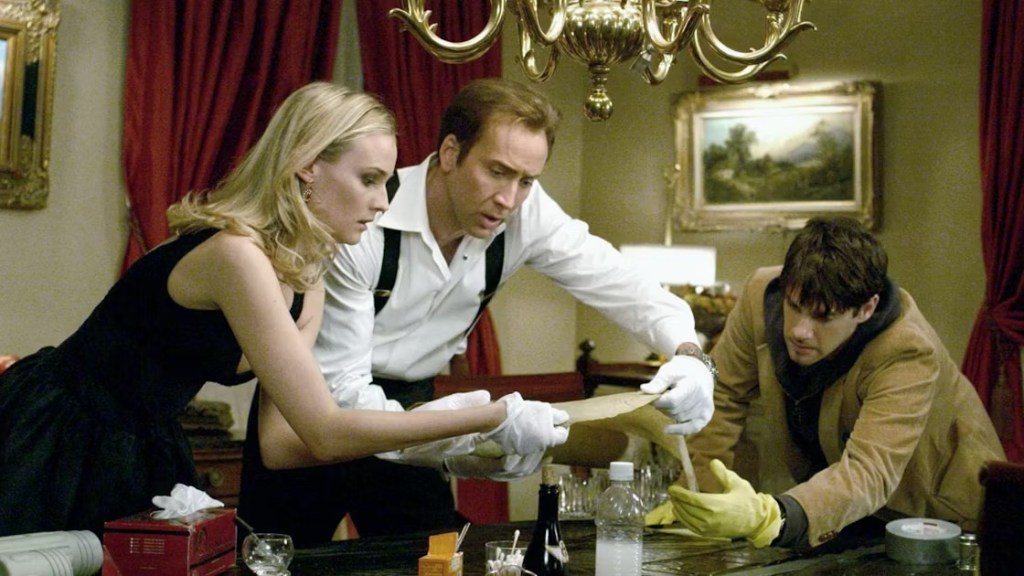Film critics understand movies inside and out because that’s what the job calls for. We know what makes a movie great and we inversely know what derails a film. Yet, sometimes, we collectively go too hard on a picture for what it isn’t, and in doing so we lose sight of the film’s inherent entertainment value. Critical scores are all well and good, but they cannot capture the actual experience of a movie, after all.
Videos by ComicBook.com
National Treasure is a great example of a feature that may not get everything right but it nonetheless deserves credit for its collective strengths. And it has plenty of them. This flick delivers a rip-roaring good time complete with a fast-paced narrative and a standout showing from Nicolas Cage in the lead role. Despite all that, National Treasure remains largely maligned by film scholars. How maligned is the film? We’re glad you asked. National Treasure holds a Rotten Tomatoes critical approval rating of just 46% with more than 175 reviews tallied.
Despite a Low Rotten Tomatoes Score, National Treasure Is a Feat of Escapist Entertainment

Some critics got hung up on the film’s historical inaccuracies, while others accused the flick of being derivative or completely improbable. Those criticisms aren’t completely unfounded. For instance, screenwriters Jim Kouf, Cormac Wibberley, and Marianne Wibberley take certain liberties with the script and even make a few claims within the narrative that aren’t quite correct. However, this is a film about stealing the Declaration of Independence to view the invisible treasure map on the back. The picture is an unapologetic work of fiction that melds fantasy with historical context and should therefore be entitled to a certain amount of leeway.
As for accusations that National Treasure is derivative, well, it isn’t wholly original. It’s clear that the narrative takes ample inspiration from the Indiana Jones films. With that said, we live in an era of remakes, reboots, and sequels. Wholly original ideas are scarce at this point due to the sheer amount of content that’s been created thus far. Even still, National Treasure carves out a path that’s different enough from some of its inspirations to stand on its own two feet.
The complaint that the film is too unrealistic probably comes down to personal preference. Yes, National Treasure is utterly improbable. But it is a film designed to help the viewer escape their reality. And in that conceit, the flick succeeds remarkably. It spirits away those of us willing to suspend our disbelief to a fantastical place where nothing is what it seems. That approach may not translate to fine art, but there’s a place for films like this.
Popcorn entertainment has inherent value despite what some might say. Escapist cinema helps us check out of our reality safely and healthily. It may not be quite as artistically rendered as more acclaimed fare, but we, as humans, need the chance to escape on occasion. And films like National Treasure provide us with a safe space in which to do just that.
Now that we’ve made a case regarding the importance of escapist cinema, let’s talk a bit more about what the film gets right. And we’d like to think it gets plenty right.
National Treasure deftly melds action tropes with historical fantasy elements, taking viewers on a wild and unpredictable adventure. The flick invokes a sense of wonder as the core characters navigate one fantastical scenario after another.
Lead actor Nic Cage is in fine form here, delivering a somewhat restrained performance, keeping it grounded more often than not. His character, Benjamin Franklin Gates, possesses a sense of childlike innocence that helps make the outlandish nature of the subject matter read as more accessible. His unwavering conviction gives the audience permission to buy into the preposterous nature of the proceedings.

Also effective is the film’s unrelenting pace. The action begins early on and almost never lets up. That’s a smart move that goes a long way toward keeping the audience engaged. The writers, along with director Jon Turteltaub, understand that the proceedings are plenty preposterous, but seeing as the action never relents, they don’t give us a lot of time to question how plausible the proceedings are.
In case you’re struggling to recall just how preposterous the proceedings actually get, allow us to provide some added context. National Treasure follows treasure hunter Benjamin Gates as he pieces together clues in a never-ending search for hidden treasure. His quest finds him stealing the Declaration of Independence to protect the document (and the treasure to which it leads) from his former partner Ian (Sean Bean), a cynical financier with little regard for the historic significance of the bounty at stake.
All in all, National Treasure is a farcical affair that may not get every last thing right, but this 2004 feature is undeniably entertaining. Though escapist cinema may not be considered fine art, it has its place in the cinematic pantheon. Accordingly, the film deserves better than its abysmal 46% Rotten Tomatoes score.
For anyone keen to escape into National Treasure, you can find the film streaming on Disney+.









